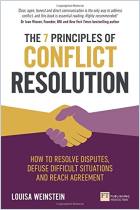Зарегистрируйтесь на getAbstract, чтобы получить доступ к этому краткому изложению.

Зарегистрируйтесь на getAbstract, чтобы получить доступ к этому краткому изложению.
Liane Davey
The Good Fight
Use Productive Conflict to Get Your Team and Organization Back on Track
Page Two, 2019
Что внутри?
Conflict is good for your team – if you can learn how to use it productively.
Recommendation
People tend to want to avoid conflict, but business strategist Liane Davey calls on leaders to foster more – not less – dissent within their teams. She believes conflict has many benefits, like fostering healthy relationships and inspiring higher levels of performance. By contrast, avoiding conflict accumulates “conflict debt,” which prevents teams from working together effectively. Using a straightforward, clear voice, Davey offers valuable guidance in how to create everyday moments of productive conflict. Her strategies will help you strengthen your problem-solving skills.
Summary
About the Author
Liane Davey, is the author of the New York Times bestseller You First. A public speaker and a business strategist, she earned a doctorate in organizational psychology from the University of Waterloo.

















Comment on this summary